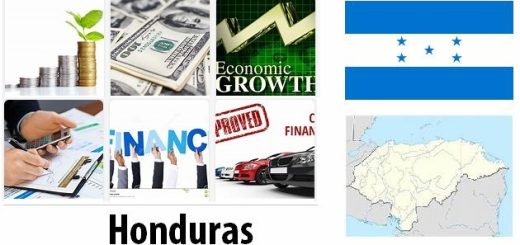Nicaragua Economy Facts
Economical overview
Nicaragua is the second poorest country in Latin America after Haiti. Agriculture is the basis of the economy, although the industrial sector has grown in recent years, as has tourism. Resources and income are unevenly distributed and unemployment is high, but the Sandini government has given micro-farmers microcredit to improve their livelihoods. Nicaragua is dependent on aid and suffers from large trade and budget deficits.
The economy was wrecked during the civil war in the 1980s, but has gradually recovered since the mid-1990s, even though hurricanes Mitch 1998 and Felix 2007 caused setbacks, as did the global financial crisis of 2009. In recent years, the economy has been one of the fastest growing in Central America and the Caribbean. However, the unrest that erupted in April 2018 has hit the trade hard and risks pushing growth.
- Countryaah.com: Major imports by Nicaragua, covering a full list of top products imported by the country and trade value for each product category.
Nicaragua is dependent on aid and foreign loans. Following a decision by the World Bank and the IMF in 2004, almost three quarters of the country’s foreign debt was written off. This was done within the framework of HIPC (Highly Indebted Poor Countries), a program for high-indebted poor countries. However, the government took out new loans, mainly from Venezuela and the IMF, which built on the external debt again. In addition, the state had already incurred domestic debts in the 1990s after compensating landowners who had their properties confiscated during the Sandinist regime in 1979-1990.
Since 1994, Nicaragua has implemented several restructuring programs with privatizations of state-owned enterprises, cuts in public spending and reductions in customs fees to obtain loans from the IMF. The first programs helped get the economy started. From the end of the 1990s, the IMF also began to focus on poverty reduction. The support through the international credit institutions has become even more important for Nicaragua since the US and the EU froze parts of its assistance in 2009. This resulted in a financial loss of about $ 120 million. The consequences of this were mitigated by new IMF loans and by aid and loans from Venezuela, including in the form of cheap oil.
- Abbreviationfinder.org: Check this abbreviation website to find three letter ISO codes for all countries in the world, including NIC which represents the country of Nicaragua. Check findjobdescriptions to learn more about Nicaragua.
The assistance from Venezuela was mediated through the Alba cooperation organization and was not included in the state budget. Following pressure from the IMF, the Nicaraguan central bank reported in 2013 how large sums it was.
An important contribution to the economy is the money that Nicaraguan residents living abroad send home. Money shipments are estimated to amount to close to 10 percent of GDP in recent years.
FACTS – FINANCE
GDP per person
US $ 2,029 (2018)
Total GDP
US $ 13,118 million (2018)
GDP growth
-3.8 percent (2018)
Agriculture’s share of GDP
15.5 percent (2018)
Manufacturing industry’s share of GDP
14.2 percent (2018)
The service sector’s share of GDP
50.2 percent (2018)
Inflation
5.6 percent (2019)
Government debt’s share of GDP
37.2 percent (2018)
External debt
US $ 11,457 million (2017)
Currency
Cordova
Merchandise exports
US $ 4,169 million (2018)
Imports
US $ 5,802 million (2018)
Current account
US $ 83 million (2018)
Commodity trade’s share of GDP
90 percent (2018)
Main export goods
coffee, meat, seafood, tobacco, sugar, gold
Largest trading partner
USA, El Salvador, Costa Rica, Venezuela, Honduras, Mexico, China
2010
December
The power of the military is expanded
Laws are passed that increase the military’s influence over the country’s government. Among other things, a national border commission and a new system for monitoring and collecting information will be established. Both institutions are subject to military control.
November
Adjacent to the International Court of Justice
Costa Rica appeals to the International Court of Justice (ICJ) in The Hague on complaints that Nicaragua has made military intrusion on Costa Rican territory as the country began dredging in the area and started building at least two channels to connect the San Juan River with the Caribbean Sea. Costa Rica also opposes the dredging itself, for environmental reasons.
June
Mining cleared
All land mines deployed in Nicaragua during the civil war of the 1980s have now been removed, authorities say. This means that land areas that no one has been allowed to enter for almost 30 years can start to be used again. Most of the mines were on the borders of Honduras and Costa Rica.
May
One-time bonus for public employees
Ortega receives criticism from the International Monetary Fund (IMF) as he promises 120,000 public employees a bonus of the equivalent of $ 25 a month in addition to his salary. The bonus will be funded with funds from the regional trade cooperation Alba, which is led by Venezuela. The IMF warns that the bonus will lead to increased inflation in the country and suspend its ongoing talks with the Government of Nicaragua. By extension, the payment of loans to Nicaragua is threatened.
April
HD judges refuse to resign
An emergency crisis breaks out when the regular term of office expires for two judges in the Supreme Court who refuse to leave their posts with reference to Ortega’s decree in January. When the opposition wants to regain its seats in the National Assembly to try to repeal the decree, they are obviously hindered by government supporters blocking the parliament building.
January
Ortega extends office hours
The president issues a decree that indefinitely extends the tenure of a number of politically appointed officials, such as judges in the Supreme Court, the head of the electoral authority and the country’s human rights ombudsman. The President justifies this because he must ensure “institutional stability” as the National Assembly cannot agree on the successors of the posts. The opposition is protesting and initiating a boycott of the work of the National Assembly.













